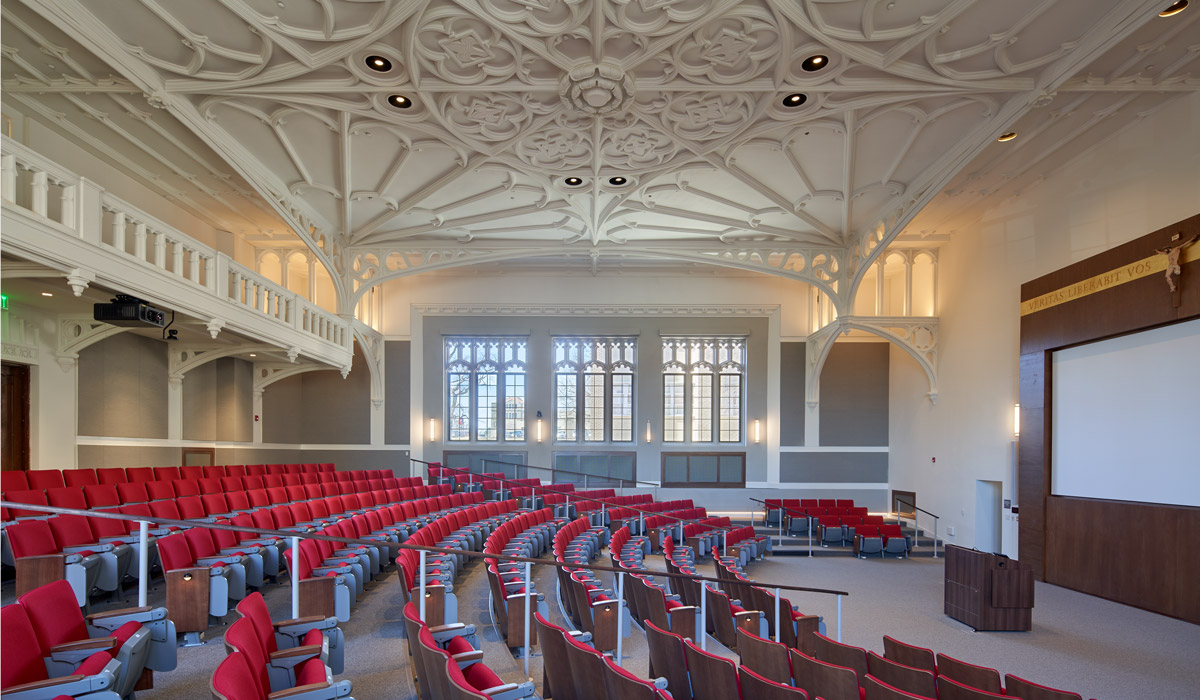Since Spring 2020, the Facilities Planning and Management (FPM) division and Office of Campus Sustainability has been collaborating with Busch School of Business students enrolled in the MSBA 5150 Team Field Study course. In this course, students work in teams to analyze a real-world business problem under the guidance of a sponsoring company, or in this case Catholic U’s Office of Campus Sustainability. The students develop solutions to the problems by drawing on lessons learned in the classroom and present their final recommendations to key University stakeholders.
Spring 2022
In Spring 2022, a team of five students from the Busch School of Business worked with the Office of Campus Sustainability on assessing and proposing options to communicate sustainability metrics to the Catholic University community.
The goal was to create a plan for a ‘sustainability dashboard’ that would spread awareness of sustainability efforts on campus, promote discussions and individual actions for improving sustainability, and ultimately work towards preserving the Catholic University campus for future generations.
The Busch School students conducted secondary research on other university dashboards, focus groups and interviews, and a survey of the campus community. From the data gathered, the students were able to determine that the specific metrics that the Office of Campus Sustainability chooses to communicate matter significantly and that audiences best connect with dashboards that connect individual actions to community efforts to larger scale impacts.
Using this insight, students created an example dashboard for the Office of Campus Sustainability as well as developed recommendations on how best to develop it. The students presented their work during Research Day 2022 and directly to the Office of Campus Sustainability and the FPM division. Based on their insight, the Office of Campus Sustainability has since integrated metrics into the Sustainability website’s Energy, Water, and Recycling & Waste webpages.
Spring 2021
In Spring 2021, a team of five students from the Busch School of Business worked with FPM to identify ways to achieve sustainable behavioral changes on campus specifically related to waste management.
The students’ goal for the semester was to develop insights about behavioral changes to provide recommendations that elevate, expand, encourage, educate, and engage the campus community to reduce the amount of waste they generate and better recycle and compost on campus.
The Busch School students conducted focus groups with freshmen, seniors, and graduate students; a survey of the entire campus community; and four interviews with subject matter experts on and off campus. Using the insight from this extensive research, the students developed ten recommendations to instill behavioral changes. These included: implementing a three-bin waste disposal system across campus; creating an online dashboard to share waste disposal statistics and trends with the campus community; forming strategic partnerships with offices and departments across campus; expanding social media coverage of waste disposal best practices; educating incoming students about waste disposal; investing in reusable products; expanding poster placement; improving communications language to better target specific audiences; sponsoring waste disposal competitions on campus; and hosting open forums to discuss progress.
As a final step, the students also developed mock-ups of various types of communications and educational materials recommended, such as posters and social media posts. The students presented their work during Research Day 2021 and directly to the FPM division.
Spring 2020
Investigating Opportunities
The FMO department strives to provide high quality, integrated services to enable the University to operate at the highest levels of excellence and efficiency. The department manages and maintains more than 50 buildings on campus. Many of these buildings from Pryzbyla to Pangborn Hall operate their HVAC systems on a 24-hour basis. Studies have shown that running buildings on a 24-hour basis is unnecessary and can increase utility expenditures, increase maintenance costs, and reduce equipment life. Many automated HVAC systems exist that address this issue. Some companies claim they can reduce energy use by 20-40% when changing from weekly building schedules to automated scheduling.
The team of four students was asked to investigate opportunities to implement energy-saving technologies to complement current energy best practices such as the Energy Project, the existing building automation system, and the University’s work order software. The team developed criteria according to budget, expertise requirements, maintenance requirements, and installation expenses. From there, the students looked on the open market for tech solutions that could seamlessly integrate into Catholic U's current operations.
Uncovering Solutions
To gain an understanding of current energy management resources, the students interviewed FPM and procurement staff. Talking to the FPM team gave them an understanding of potential synergies with existing energy technologies and assessed staff readiness to incorporate a new system.
Taking these thoughts into consideration, the students looked at what other universities of similar size, both by population and geography, and operating capacity used to manage their energy use. Finally, they looked at the University’s utility trends and completed a financial analysis to determine a return on investment. With all of this information, the students created a detailed packet narrowing down the options explaining each energy management software solution and whether it was a good fit for Catholic U.
Planning for the Future
In May 2020, the students presented their findings to FPM and the Finance Division. With the FMO collaboration, the students gained an understanding of how real projects work and gained insight into the decision making process. This first-hand experience will help set them apart as they enter the professional world post-graduation.

